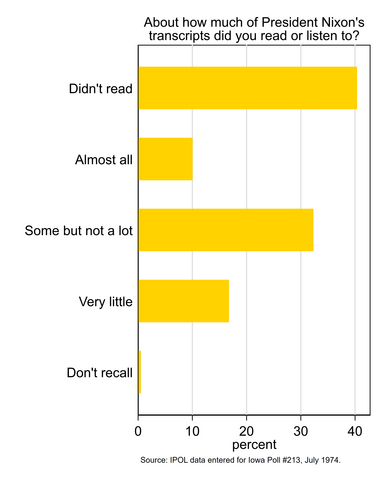Results from Iowa Poll #213, which was conducted about a month before President Richard Nixon’s resignation from office, revealed that a majority of Iowans had read or heard some, but not all the Nixon transcripts. Data from Iowa Poll #213, a random sample survey of 601 Iowans in July of 1974, has recently been restored by students in IPOL.
When asked “did your read or hear any of President Nixon's edited transcripts of conversations related to Watergate?” 40.5% of respondents indicated that they had not heard or read them.

Responses show that higher educational attainment coincided with increases in awareness of the Watergate transcripts: 48.8% of respondents with less than a high school education had read or heard the transcripts, 56.0% of those who had graduated from high school, trade, or business school had done so, as had 70.4% of those who had attended at least one year of college.
Those that had read or heard them were then asked “about how much of the transcripts did your read or listen to”. 16.9% had read or heard “almost all” of them, 54% reported having read or heard “some, but not a lot, of” the transcripts, and 28.1% had read “very little” of them. 22.6% of those aged 50-64 said that they had read or heard almost all of the transcripts, which was 6% more than the second likeliest group to choose this option (respondents aged 65+). Overall, those aged 30-49 were most likely to have read or heard at least some, if not all of the transcripts: combined, a total of about 77% of respondents in this age group chose one of those two options, the highest of any age group.
Iowa Poll #213, conducted by the Des Moines Register, was administered to a random sample of Iowans in July 1974. In addition to the questions about top problems, the survey asked respondents their opinions on a wide variety of topics, including the economy, inflation, tax policy, and a range of questions related to Watergate. Understanding Iowans’ past opinions on these topics can help us understand how perspectives have changed and what ideas have remained popular. IPOL has also been working with UI Libraries and the Des Moines Register to restore data from dozens of Iowa Polls from the 1960s to early 1980s. More information about the project can be found here. We are working to release a full report on our findings as we analyze additional questions.